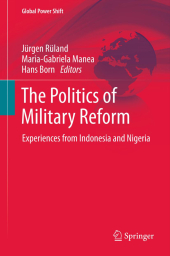 Neuerscheinungen 2014Stand: 2020-02-01 |
Schnellsuche
ISBN/Stichwort/Autor
|
Herderstraße 10
10625 Berlin
Tel.: 030 315 714 16
Fax 030 315 714 14
info@buchspektrum.de |

Hans Born, Maria-Gabriela Manea, Jürgen Rüland
(Beteiligte)
The Politics of Military Reform
Experiences from Indonesia and Nigeria
Herausgegeben von Rüland, Jürgen; Manea, Maria-Gabriela; Born, Hans
2012. 2014. xx, 240 S. 13 Tabellen. 235 mm
Verlag/Jahr: SPRINGER, BERLIN; SPRINGER BERLIN HEIDELBERG 2014
ISBN: 3-642-43048-1 (3642430481)
Neue ISBN: 978-3-642-43048-0 (9783642430480)
Preis und Lieferzeit: Bitte klicken
This volume examines why democratization and military reforms stagnate in newly democratizing countries. It blends historical, ideational, cultural and structural explanatory factors to analyze the trajectories of military reform in Indonesia and Nigeria.
This volume seeks to explain why democratization and military reforms stagnate in newly democratizing countries. The contributions blend historical, ideational, cultural and structural explanatory factors to analyze the trajectories of military reform in Indonesia and Nigeria, two major regional powers that share many structural commonalities. In the tradition of the literature on security sector reform (SSR), the book not only scrutinizes executive initiatives toward military reform, but also provides ample coverage of societal actors. Findings show that while military reform is stagnating in both countries, societal forces ought to be taken into account more as major driving forces in explaining military reform. Several chapters study how legislatures, non-governmental organizations and the civilian defence epistemic community contribute to the transformation of military institutions. The last part of the book tackles another aspect rarely studied in the literature on military reform, namely, the role of militias in military reform.
Part I: Introduction.- Part II: Military Reform in Indonesia and Nigeria.- Part III: Legislatures and Non-State Actors in Military Reform.- Part IV: Rogue Forces and Military Reform.- Part V: Conclusion.


